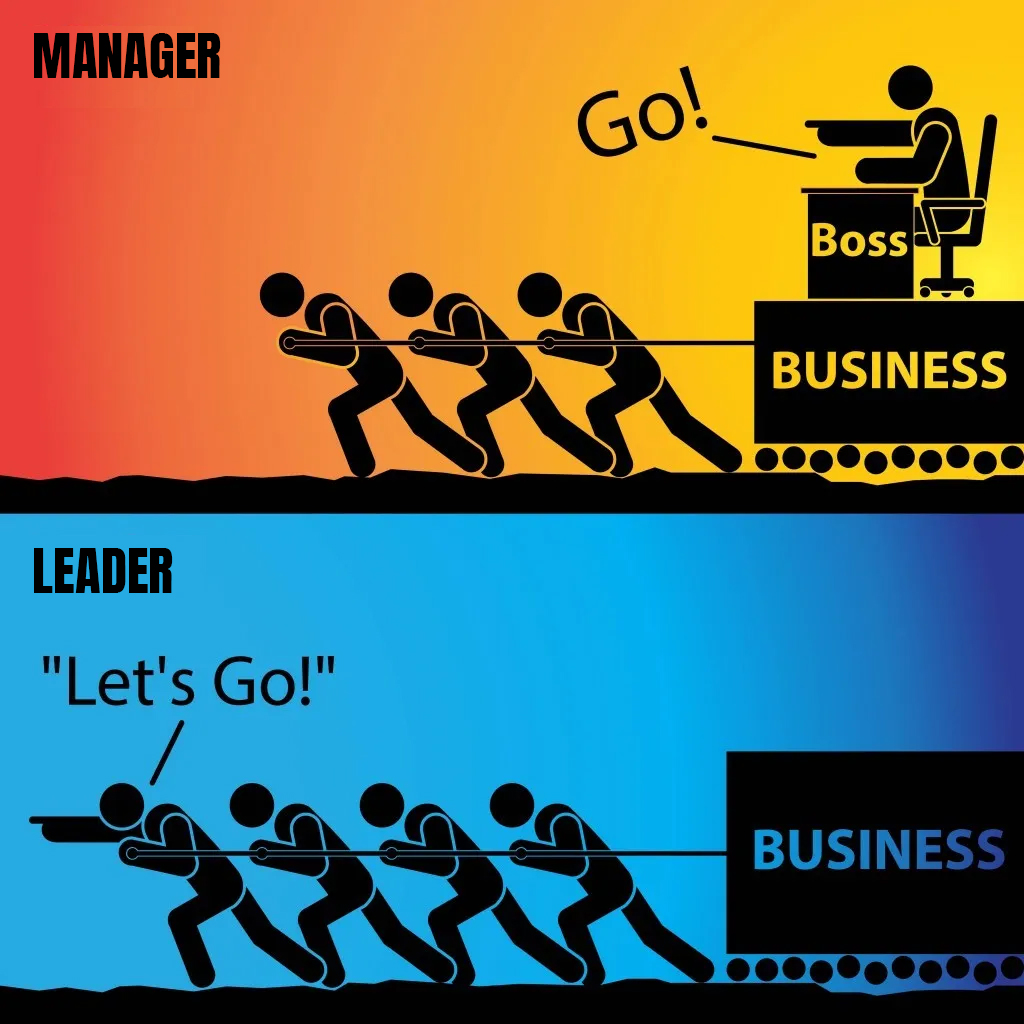If you want to enhance your leadership skills and significantly impact your team and organization, this article is designed specifically for you.
Transitioning from a manager to a leader requires a mindset, approach, and skill set shift. Let’s explore the key attributes and strategies that distinguish exceptional leaders from average managers. You will gain practical insights and actionable steps to elevate your leadership capabilities and inspire your team to achieve extraordinary results.

Understanding the Difference between Management and Leadership
First, Let’s clarify the fundamental distinctions between management and leadership roles.
Discover how to effectively balance both functions while maximizing your impact as a leader.
In today’s fast-paced business world, it is crucial to recognize the fundamental distinctions between management and leadership roles. While the terms “manager” and “leader” are often used interchangeably, they encompass distinct responsibilities and approaches. Management primarily involves overseeing day-to-day operations, ensuring tasks are executed efficiently, and maintaining organizational processes.
On the other hand, leadership focuses on inspiring and guiding a team toward a shared vision, driving innovation, and fostering a culture of growth and development.

A Manager:
Conversely, a manager is an individual assigned to a specific formal position or role within an organization. Managers are responsible for overseeing day-to-day operations, allocating resources, and ensuring that tasks are completed efficiently. They focus on planning, organizing, and coordinating activities to meet organizational objectives. While some managers may possess leadership qualities, their primary responsibility is to manage the team’s performance and achieve predefined targets. Managers enforce policies and procedures, monitor progress, and provide feedback on task execution.
What a Manager Does:
- Plans and Organizes: Managers develop plans, set objectives, and organize resources to achieve specific outcomes. They break down tasks and allocate responsibilities among team members.
- Monitors Performance: Managers track progress, measure results, and ensure that team members meet established performance standards.
- Implements Policies: Managers enforce organizational policies and guidelines, ensuring that team members adhere to established rules and procedures.
- Provides Feedback: Managers offer constructive feedback to team members on their performance, identifying areas for improvement and recognizing achievements.

A Leader:
A leader is an individual who inspires, guides and motivates others towards a shared vision or goal. Leadership is not tied to a formal position or title; it can be exhibited at any level within an organization or community. Leaders focus on setting a compelling vision, aligning team members around it, and inspiring them to work collaboratively toward its achievement.
They lead by example, displaying integrity, empathy, and authenticity, which fosters trust and respect among their followers. Leaders are forward-thinking and adaptable, embracing change and innovation to navigate challenges and seize opportunities. They nurture a positive organizational culture, promoting growth and development for individuals and the collective team.
What a Leader Does:
- Inspires and Motivates: Leaders inspire their team members by creating a sense of purpose and direction. They motivate others to go above and beyond their potential, encouraging a commitment to shared goals.
- Builds Relationships: Leaders foster strong relationships with their team members based on trust, respect, and empathy. They understand the individual strengths and aspirations of their followers.
- Encourages Growth: Leaders promote continuous learning and personal development, supporting their team members’ growth and career advancement.
- Facilitates Change: Leaders embrace change and effectively guide their team through uncertain times by communicating a clear vision and providing direction.
In summary, while leaders and managers both play crucial roles within an organization, they possess distinct qualities and perform different functions. Leaders focus on inspiring and guiding others towards a vision, building strong relationships, and fostering a positive culture.
Conversely, managers prioritize, coordinate, and ensure that tasks are executed efficiently to meet predefined objectives. Both roles are essential for the success of an organization, and in many cases, effective leaders can also be effective managers and vice versa.
Having strong leadership skills enhances your improvement as a business owner, executive, or manager in several crucial ways:
Vision and Direction: Strong leadership skills allow you to define a clear vision and direction for your organization. As a business owner, executive, or manager, having a compelling vision inspires and motivates your team members to work towards common goals. This clarity of purpose guides decision-making and strategic planning, aligning the efforts of everyone within the organization.
Team Building and Employee Engagement: Effective leadership skills help you build and nurture high-performing teams. By understanding the strengths and aspirations of your team members, you can assign roles that capitalize on their skills, fostering a sense of purpose and engagement. Engaged employees are more committed to their work and contribute to the overall success and growth of the business.
Decision Making: As a business owner, executive, or manager, you are often faced with complex decisions that can impact the organization’s future. Strong leadership skills enable you to make well-informed and confident decisions. You consider various perspectives, weigh the pros and cons, and communicate the rationale behind your choices effectively, gaining buy-in and support from your team.
Change Management: In a dynamic business environment, change is inevitable. Effective leaders are adept at leading their teams through times of uncertainty and transition. With strong leadership skills, you can communicate the need for change, address concerns, and rally your team around a shared vision of the future, making the transition smoother and minimizing resistance.
Communication and Relationship Building: Effective leaders excel in communication, both with internal teams and external stakeholders. As a business owner, executive, or manager, you must convey your vision, expectations, and progress clearly and authentically. Building strong relationships with stakeholders, clients, and partners fosters trust and collaboration, leading to mutually beneficial outcomes for the business.
Adaptability and Innovation: Strong leadership skills help you embrace change, be agile, and drive innovation. In a rapidly evolving business landscape, being adaptable allows you to identify opportunities and stay ahead of competitors. Effective leaders encourage a culture of innovation, empowering employees to contribute ideas and solutions that drive business growth.
Employee Development: A crucial aspect of leadership is investing in the development of your employees. By providing guidance, mentorship, and opportunities for growth, you empower your team members to reach their full potential. This not only strengthens your organization’s capabilities but also increases employee loyalty and retention.
Strong leadership skills are a game-changer for business owners, executives, and managers. It enables you to inspire, guide, and empower your team to achieve exceptional results, navigate challenges with confidence, and foster a culture of excellence and innovation. By continuously honing your leadership abilities, you can drive positive change, maximize your organization’s potential, and impact your business’s success.
Leadership development is not a destination but a continuous, lifelong journey that requires a significant personal commitment. True leadership goes beyond acquiring a position or title; it involves continuous self-improvement, learning, and growth. It requires the willingness to challenge oneself, step out of comfort zones, and embrace new perspectives. Moreover, leadership is not confined to one’s professional life; it extends to all aspects of their existence, including personal relationships and community involvement.

Ten Reasons to Invest in Leadership Development
As a company or individual, investing in leadership development programs yields a multitude of benefits that can significantly impact success and growth:
- Enhancing leadership skills: Leadership development programs provide individuals with the tools and knowledge to excel in leadership roles. Strengthening essential communication and decision-making skills leads to more effective and confident leaders.
- Fostering employee engagement: Engaged employees are more committed and dedicated to their work. Leadership development programs equip leaders with the skills to engage and motivate their teams, leading to higher job satisfaction and lower turnover rates.
- Driving innovation and creativity: Leaders with a growth mindset foster a culture of innovation. Leadership development programs encourage creative thinking, inspiring teams to generate fresh ideas and drive continuous improvement.
- Building strong teams: Effective leaders create cohesive teams by understanding team dynamics and promoting collaboration. Leadership development programs enable leaders to nurture talent and build a diverse and harmonious workforce.
- Driving organizational performance: Effective leaders align teams with the company’s vision and values, driving overall performance and achieving strategic goals.
- Adapting to change: In today’s fast-paced business environment, adaptability is crucial. Leadership development programs cultivate resilience and agility, allowing leaders to lead confidently through change.
- Cultivating a leadership pipeline: Leadership development programs focus on current leaders and identify and groom future leaders within the organization. This ensures a continuous supply of capable leaders ready to take on higher responsibilities.
- Retaining top talent: Investing in leadership development demonstrates a commitment to employee growth and development. This can enhance employee loyalty and retention, as individuals are more likely to stay with a company that invests in their professional growth.
- Improving decision-making: Leadership development programs hone leaders’ critical thinking and problem-solving skills, leading to more effective and informed decision-making across the organization.
- Strengthening organizational culture: Effective leadership significantly impacts organizational culture. Leadership development programs promote positive leadership behaviors that trickle down and positively influence the entire workforce, shaping a culture of success and collaboration.

The transformational triangle of change
The transformational triangle of change illustrates a powerful relationship between leadership skills, team performance, and company improvement. As individuals focus on enhancing their leadership abilities, they become more adept at inspiring, empowering, and guiding their teams.
This improved leadership leads to increased team members’ motivation, engagement, and productivity. Studies have shown that companies with transformational leaders experience significant positive outcomes. According to research by Gallup, organizations with highly engaged teams exhibit 21% higher profitability.
By investing in leadership development programs, both companies and individuals create a positive ripple effect throughout the organization, resulting in enhanced performance, greater innovation, and a sustainable pipeline of capable leaders prepared for future challenges. These programs are beneficial for the growth of individuals in leadership positions and the organization’s overall success and competitiveness.





